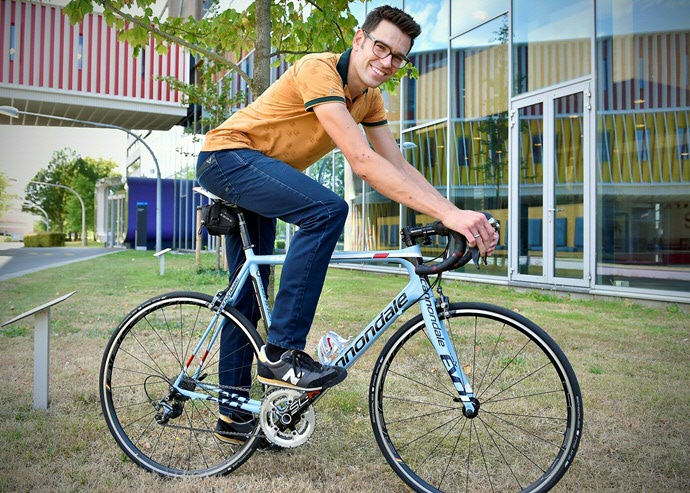Being as green as you should be can cause great social inconvenience

Jan Willem Bolderdijk must be the ideal son-in-law. He is cheerful, athletic and articulate. He cares greatly about sustainability and is highly aware of the consequences of his choices. But he did book that trip to Thailand. Why is it so difficult to be principled? Bolderdijk talks about his research on the ‘rough edges’ of sustainable behaviour.
Text: Riepko Buikema / Photographs: Elmer Spaargaren
‘You don't have to be a rocket scientist to conclude that the climate is going continue to change if we don’t adjust our behaviour. At the same time, I regularly do things that are not sustainable at all. Like that long-distance holiday flight last year. It was a wonderful trip, but it also made me feel uncomfortable. I always tell myself that this was definitely my last, but whether I can stick to this intention remains doubtful, to be honest. So I keep asking myself: why am I unable to radically change my behaviour?’
Nagging unease
His dark eyes shift sideways as he addresses his struggle with a guilty smile on his face. This nagging unease inspires his research at the intersection of social psychology and marketing. ‘I’ve noticed that I find it rather awkward sometimes to tell others about my sustainable intentions. That fascinates me. Is it just me, or do more people feel bothered in doing so?’
Immoral prole
His conclusion: sustainable behaviour sometimes leads to unease in social relationships. ‘You and I will probably agree on something harmless, such as recycling batteries, but when I refuse to eat meat and tell you that I find the treatment of pigs unethical, we might soon end up in opposite corners - particularly if you do eat meat. Research tells us that, in such situations, meat eaters tend to believe that the other person sees them as an immoral, anti-social person. That thought alone creates social friction.’

Precautionary silence
Conversely, Bolderdijk found that this sense of unease can also influence those who seek to lead the way in sustainable intentions. ‘Prevailing academic opinion used to be very cynical about this: those who engage in moral behaviour want to shout it from the rooftops, for we only do so if it benefits our reputation. People who donate a lot of money primarily do so to show others how wealthy and altruistic they are. My research has nuanced this finding: sometimes the most conscientious people actually remain silent to avoid social friction with their surroundings. We discovered, for instance, that some vegetarians refrain from voicing their beliefs to avoid unpleasant discussions.’
Taboo on ‘what is good’
How does this social unease influence the market shares of green products? Could a taboo on ‘what is good’ help to explain why it is so difficult for many sustainable products and behaviours to become mainstream? ‘Many people know that air travel and concern about climate change don’t go together very well. To avoid social friction, however, the subject of flying less is not often discussed out in the open. The prevailing view seems to be: everyone is flying, everyone is OK with that, so I guess I'll fly too. This causes an interaction: the norm persists because all that people see in their surroundings are other people who keep doing the same things. It used to be the same for meat consumption, although this has been gradually changing in recent years. A great taboo still rests on more fundamental issues, however, such as slowing down population growth.

Tony Chocolonely and the flexitarian
It is high time for a positive change. How can we use our knowledge about social friction to promote sustainable behaviour? ‘Tony Chocolonely chocolate is a classic example of a successful moral innovation. This chocolate not only has the reputation of being an ethically responsible product, it is also known for its better taste. Using taste as an argument makes it easy to legitimize your choice for Tony Chocolonely and avoid an implicit moral judgment of those who prefer different brands. So it may be easier to sell sustainable products that offer consumers a safe, non-moral excuse to justify their choice.’
The surge of the flexitarian is another example. ‘I am very happy that we have flexitarians now; they allow everyone to be flexible about eating meat, moving the debate about meat consumption out of the trenches. Becoming 100% vegetarian is quite a step for many people, and one that reflects a strong view on eating meat. The option to live as a flexitarian makes eating less meat much less threatening.’
Mirror
Ultimately, we all want to be able to look at ourselves in the mirror, the researcher concludes. ‘For many people this means living sustainably and occasionally caring about the future. I am no different. This usually works fine, as long as you're not confronted with similar-minded people who make better choices than you in the same situation. It is this social friction that I find extremely fascinating.’
More news
-
09 December 2025
Are robots the solution?
-
10 November 2025
Decentralization of youth care
